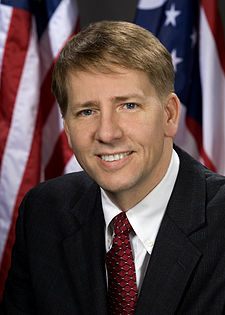No chance of happening but wow
Coburn to Offer $9 Trillion Budget-Cut Plan to Spur Debt Talks
July 17, 2011, 3:41 PM EDT
By David Lerman and Laura Litvan
(Adds Treasury comment in 17th paragraph.)
July 17 (Bloomberg) --
Republican Senator Tom Coburn said he will unveil a plan tomorrow that would cut $9 trillion from the federal budget over the next 10 years in an effort to curb spending and avoid a default on U.S. debt.
While he said he doesnt expect his plan to pass Congress, it would offer a wide range of spending cuts and revenue increases that could be used as the basis for bipartisan negotiations on a budget compromise.
We have $9 trillion worth of savings that are achievable over the next ten years, Coburn said on CBSs Face the Nation program. Pick half of them. Half of them solve our problems.
With Washington deadlocked on a strategy to cut spending and raise the nations borrowing limit before an Aug. 2 deadline, the Oklahoma Republican said he will offer a 10-year plan that cuts defense by $1 trillion, makes changes to Social Security and Medicare, and raises $1 trillion through changes in the tax code, among other things.
Some Republicans, including Senate Minority Whip Jon Kyl of Arizona, have resisted any talk of tax increases as part of a budget deal.
We should focus on the real problem, the spike in spending, and not this phony problem of taxes, Kyl said on ABCs This Week program.
Tax Loopholes
Yet Republican Senator Lindsey Graham of South Carolina said today he would consider closing tax loopholes like the ethanol subsidy to boost revenue as part of a budget deal.
I would be willing to close loopholes and put some of the money on debt retirement, but I will only do that in the context of a serious plan to balance the budget, Graham said on CNNs State of the Union.
Coburns push to cut defense by $1 trillion over 10 years is likely to draw opposition. President Barack Obama has called for cutting military spending by $400 billion over 12 years, while rejecting an earlier proposal for a $1 trillion cut as excessive.
I think we need to cut defense, but as commander in chief Ive got to make sure that were cutting it in a way that recognizes were still in the middle of a war, Obama said at a July 15 news conference.
Not Super Hard
Coburn said a $1 trillion cut to defense over a decade is difficult, but its not super hard.
Coburns plan also would cut almost $2 trillion in non- defense discretionary spending over 10 years, while raising about $1 trillion in new revenue by cutting or eliminating tax breaks and loopholes by about 10 percent, according to a congressional aide.
Coburn said his plan, if enacted in its entirety, would save $1 trillion in interest payments over the next nine years.
The White House, meanwhile, is continuing to reach out to lawmakers in both parties this weekend in search of a deficit- cutting deal as the default deadline looms.
I think theres still time to get something big done, said Jack Lew, the White House director of the Office of Management and Budget, on NBCs Meet the Press.
The question is, do we have a partner to work with? And I hope the answer to that is yes, Lew added.
No Alternative
Treasury Department officials continue to reject suggestions they could prioritize payments and insist there are no alternatives to raising the debt limit, a Treasury official said today. About $90 billion in debt matures on Aug. 4 and more than $30 billion in interest comes due Aug. 15, said the official, who declined to be identified because the departments discussions arent public. Overall, more than $500 billion matures in August.
White House spokesman Dan Pfeiffer said on Twitter that President Barack Obama, Vice President Joe Biden and other White House officials were discussing various options with lawmakers throughout the day yesterday.
Republican House Speaker John Boehner is keeping the lines of communication open, said his spokesman, Mike Steel. But Steel couldnt offer assurances that a deal will be reached soon.
Conversations have continued throughout the weekend, but there is no news or progress to report, Steel said by e-mail today.
Fallback Plan
In the Senate, a fallback plan by Minority Leader Mitch McConnell that allows the president to unilaterally raise the debt limit is moving ahead. McConnell and Majority Leader Harry Reid this weekend are negotiating changes to his proposal, with a goal of putting a measure before the Senate as early as Wednesday, said a Senate Democratic aide.
The two are still discussing ways to alter McConnells complex proposal, which would let the president raise the ceiling on borrowing authority by $2.5 trillion by the end of 2012 with support of just over one-third of the members of each chamber.
Coburn said today he is unlikely to support such a plan because it doesnt cut spending enough.
A $2 trillion package will do nothing to reassure the world economic community that we get it, he said, adding any deal must include at least $4 trillion of cuts.
Graham said he also would resist the McConnell-Reid stopgap measure. He said on CNN he doesnt have any confidence that the proposal of the Senate leaders is going to lead to the solutions that we need.
Tough Votes
McConnell wants the increase in the debt limit to occur in three stages, forcing Democrats to take a series of tough votes before next years elections.
Democrats are seeking to reduce the number of debt-limit votes to two, and they are also pushing to include caps on discretionary spending over the next two years, the aide said. Such caps would help forestall repeats of the government shutdown battle that dominated Congress for much of this year for the remainder of Obamas term.
McConnell and Reid are nearing agreement on a new joint congressional committee on deficit reduction that would be included in the plan, the aide said. The bipartisan panel would have eight or 12 members, and would make recommendations as early as next year on a broad plan to curb record-high deficits. The plan it produces that would be protected from a Senate filibuster and couldnt be amended, protections similar to those offered a commission that has recommended military base closures, the aide said.
While the two Senate leaders are continuing to discuss a package of $1 trillion to $1.5 trillion in spending cuts that could be attached to the legislation, it is unclear whether the package will be agreed to when the measure is introduced, the aide said.
--With assistance by Ian Katz, Julianna Goldman and Brian Faler in Washington. Editors: Ann Hughey, Robin Meszoly.




